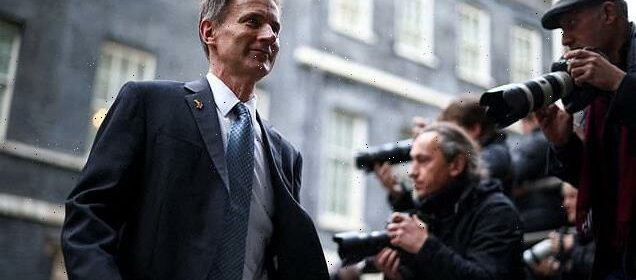Prime Minister advised to either raise taxes or hit pensions

Rishi Sunak’s budget dilemma: Prime Minister is advised he has to either raise taxes or hit pensions to get Britain’s finances on track
- The hole in the public finances is now estimated at up to £60billion, sources said
- Officials are struggling to raise pensions and benefits in line with spending plans
- The Prime Minister also refused to commit to the Tories’ 2019 ‘tax lock’ pledge
Rishi Sunak has been warned that he faces having to break a key manifesto commitment on either tax or pensions in order to balance the books in next week’s Budget.
During tense talks in Downing Street at the weekend, the Prime Minister and Chancellor Jeremy Hunt were told the hole in the public finances is now estimated at up to £60billion.
A Whitehall source said officials were struggling to devise a package that will allow the Government to raise pensions and benefits in line with inflation while also keeping the pledge not to raise the main rates of income tax, VAT or national insurance.
The source added: ‘The message from officials was that you may want to keep the triple lock, raise benefits in line with inflation and maintain the headline tax rates where they are, but something has got to give. They are looking at a gap of £50-£60billion. The choices are pretty grim.’
The Prime Minister and Chancellor Jeremy Hunt, pictured, were told the hole in the public finances is now estimated at up to £60billion
Yesterday, Business Secretary Grant Shapps repeatedly refused to guarantee that the pension triple lock would be restored, despite a personal pledge by Mr Sunak in May when he was still Chancellor.
Speaking at the weekend, the Prime Minister also refused to commit to the Tories’ 2019 ‘tax lock’, which pledged not to raise the headline rates of the three main taxes.
Mr Sunak and Mr Hunt have already agreed to extend a four-year freeze on income tax thresholds for another two years, potentially dragging a further three million people into higher tax bands.
The threshold for inheritance tax is also set to be frozen again, despite big increases in house prices in recent years. But Treasury officials have also drawn up options for raising taxes on higher earners, including increasing the 45p top rate of income tax.
However, a controversial plan to cut pension tax relief for higher earners has been shelved, partly because of its complexity and partly due to fears it would wreck the retirement dreams of millions. Breaking either manifesto commitment on pensions or tax would leave the PM facing a big Conservative backlash.
The idea of imposing a real-terms cut in benefit payments is also still on the table, despite causing a backlash at last month’s Tory conference.
Senior Conservatives warned yesterday that abandoning the triple lock would be seen by pensioners as a betrayal.
Ex-minister Sir John Hayes said the point of the lock was that it would be ‘secure for good’ not ‘broken at will’. He added: ‘We gave older people the guarantee that their incomes wouldn’t fall behind.
‘That’s a landmark thing and something to be proud of – we must retain it.’ The triple lock, introduced in 2010, guarantees that the state pension will rise in line with either inflation, earnings or 2.5 per cent, whichever is the highest.
The 2019 Tory manifesto pledged to keep the protection in place for the duration of this Parliament.
Mr Sunak suspended it this year because of a freak rise in average wages linked to the end of lockdown, meaning pensioners received an increase of just 3.1 per cent.
Under one option considered by the Treasury, pensions would rise in line with average earnings rather than inflation next year, meaning an increase of 5.5 per cent, instead of 10 per cent. The Institute for Fiscal Studies said that would save the Treasury around £4.5billion a year.
The threshold for inheritance tax is also set to be frozen again, despite big increases in house prices in recent years. Mr Sunak and Mr Hunt, pictured, have already agreed to extend a four-year freeze on income tax thresholds for another two years, potentially dragging a further three million people into higher tax bands
Billions more could be saved if benefit payments also rise in line with earnings, but a string of Tories have spoken out against the idea, including Work and Pensions Secretary Mel Stride.
However, any move to raise taxes will also trigger protests on the Conservative benches, with some already warning that the Budget risks sparking a deeper recession.
Tory peer Lord Cruddas said ministers ‘should be looking to reduce tax not increase them, otherwise we might as well call ourselves Lib Dems or Labour’. He added: ‘You cannot tax your way out of recession.’
Sources said the predicted hole in the public finances had worsened in recent days after the Bank of England warned that the UK was facing a two-year recession, which will depress tax revenues and push up some spending, such as benefit payments.
A final assessment of the scale of the problem will be made by the independent Office for Budget Responsibility at the end of this week, ahead of the Budget – formally called the Autumn Statement – on November 17.
Source: Read Full Article

